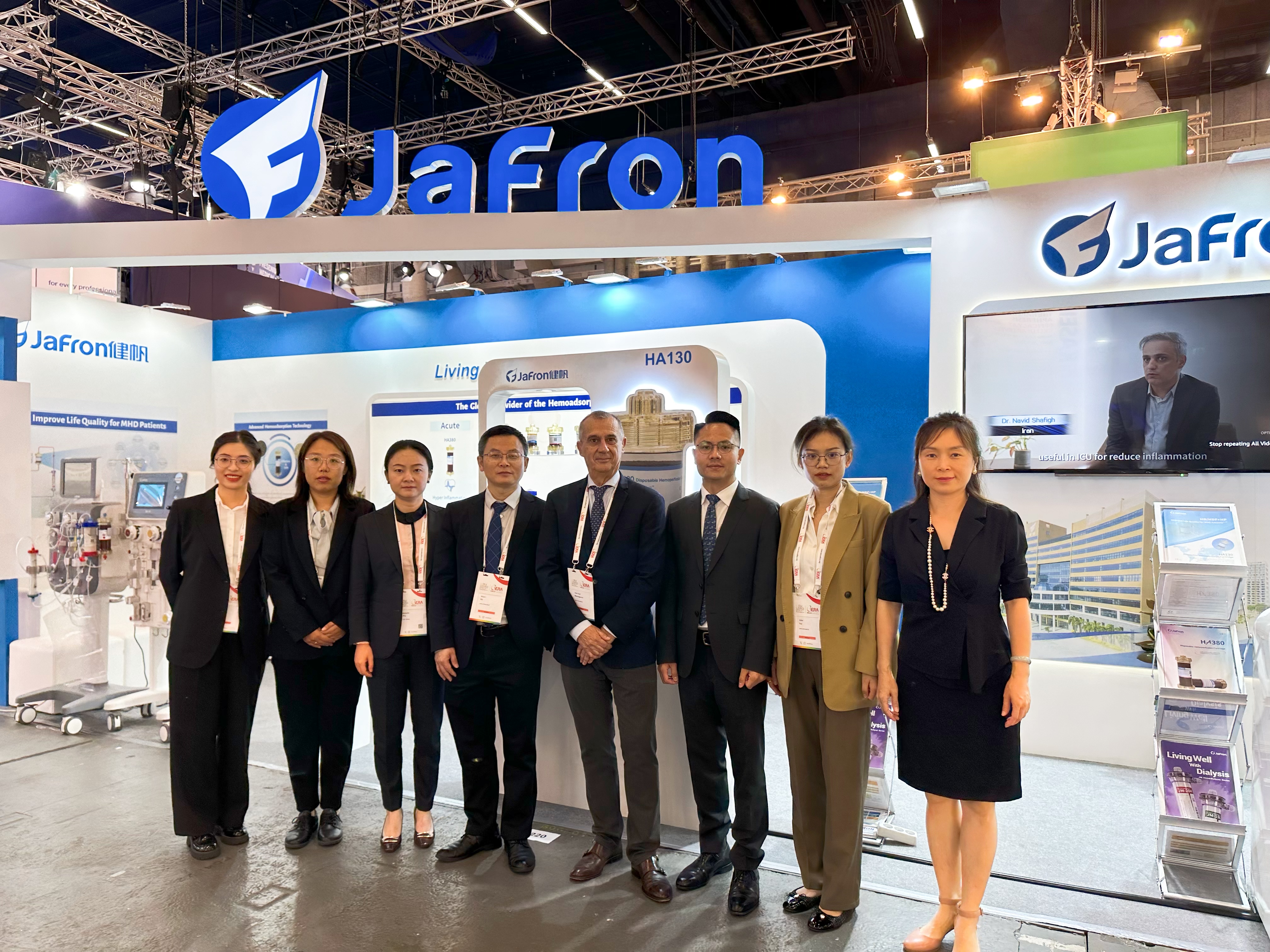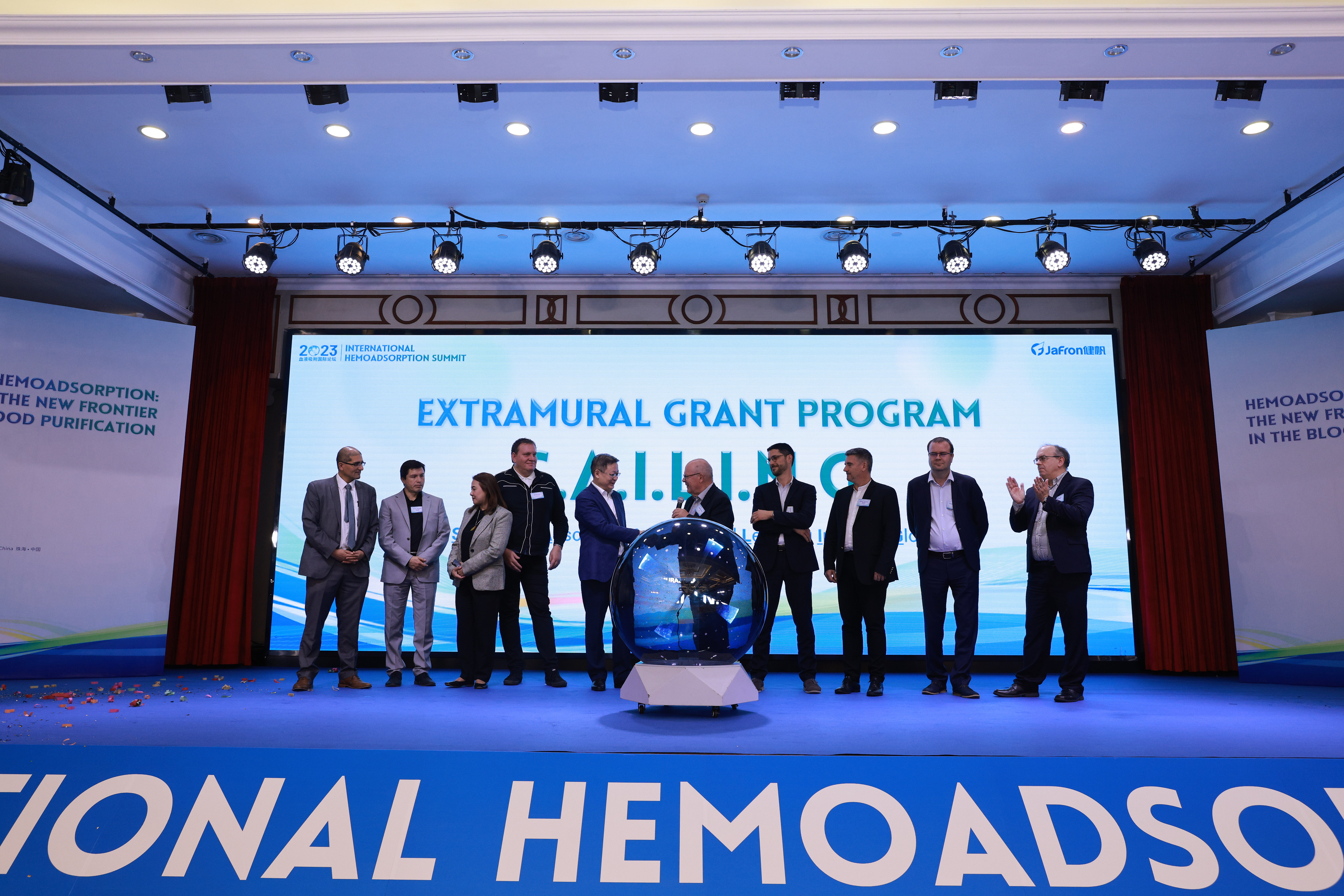Express from Jafron Industry Symposium at the 57th ERA-EDTA
Author:Sherry Zhang Date:2023-01-17
From June 6 to June 9, 2020, the 57th Congress of the European Renal Association – European Dialysis and Transplant Association (ERA-EDTA) was grandly held. This year, due to the epidemic of COVID-19, ERA-EDTA decided to conduct the academic education online. Jafron successfully held the first session of this EDTA congress as industry symposium under the topic of “Adsorption Therapy for Acute and Chronic Dialysis”. Professor Raymond Vanholder, the chairman of the European Kidney Health Alliance served as the academic chair of the symposium and leaded the academic discussion of the latest clinical evidence of hemoperfusion. As of the date of this publication, more than 1300 people has visited Jafron symposium online. Below are the essences of the academic perspective presented.
The Efficacy of Hemoperfusion Treatment on Improving the Survival of Maintenance Hemodialysis Patients: Randomized, Open-Label, Parallel-Group, Multicenter Study
Prof. Gengru Jiang, MD, PhD
Professor of Medicine, Shanghai Jiao Tong University School of Medicine
Director, Renal Division, Department of Internal Medicine, Shanghai Xinhua Hospital affiliated to Shanghai Jiao Tong University School of Medicine
Research interest: Basic and clinical research on IgA Nephropathy, Membranous Nephropathy, Cardiovascular Complications in dialysis patients.

Prof. Gengru Jiang from Shanghai, China brought out the result of a multicenter RCT to share the efficacy of hemoperfusion treatment and its benefits on improving the survival and life quality of maintenace hemodialysis patients. 1407 patients from 30 dialysis centers were divided into control group and hemoperfusion group, while in the control group patients received 2-3 time per week of blood purification treatment such as hemodialysis, hemofiltration or hemodiafiltration, and in the hemoperfusion group patients received at least one hemoperfusion therapy every two weeks based on the conventional blood purification therapy as in the control group.
Results reveals that hemodialysis plus HA130 hemoperfusion can significantly reduce all-cause mortality, cardiovascular mortality, and new or recurrent cardiovascular events. HA130 hemoperfusion plus hemodialysis could also significantly reduce the burden of disease and improve the quality of life related to nephropathy, and significantly improve the general health-related quality of life of patients. Meanwhile, hemodialysis plus HA130 hemoperfusion therapy can significantly reduce blood β2-MG level and plasma iPTH, and the long-term safety of hemodialysis plus HA130 hemoperfusion is validated.
Removal of protein bound toxins in dialysis patient: An Italian pilot study using hemoperfusion
Prof. Vincenzo Panichi, MD
Director of UOC Nephrology and Dialysisi Versilia Hospital, Lido Camaiore (Lucca) Italy.
Head of Dysmetabolic and Kidney disease Department, USL North West.
Research interest: Chronic hemodialysis, chronic inflammation in renal disease, and novel hemodialysis techniques.

Prof. Vincenzo Panichi brought out a pilot study from Italy, 17 patients were divided into high flux hemodialysis group and HA130 plus high flux hemodialysis group. At baseline, patients show no significant difference of dialytic efficiency between both groups. After two months’ therapy, the β2-MG level was reduced in HA130 hemoperfusion group. Significant reduction of PBUTs such as indoxyl sulfate and p-Cresyl sulfate wasobserved in the HA130 hemoperfusion group as well. However, due to a very short duration of the study, the itching score showed no significant reduction for the HA130 hemoperfusion group, revealing that adsorption plus hemodialysis/hemodiafiltration can be a good therapeutic option.
Cytokine Storm and the Role of Hemoperfusion in severe COVID-19
Dr. Nattachai Srisawat, MD, PhD
Division of Nephrology, Department of Medicine, Chulalongkorn University and King Chulalongkorn Memorial Hospital
Research interest: Critical Care Nephrology, Renal replacement therapy in the ICU, Septic acute kidney injury, Urinary and plasma biomarkers.

Prof. Nattachai Srisawat from Thailand brought out the study of hemoperfusion for severe COIVD-19 patients. He found that cytokine storm is common seen in COVID-19 patients, resulting in ARDS, shock, altered coagulation, AKI, or systemic capillary leakage syndrome, etc. The HA330 hemoperfusion application for COVID-19 patients shows the efficacy in reducing the cytokine level, improving the patiens’ lung function such as the PaO2/FiO2 ratio, and help patients to survive and get rid of mechanism ventilation.
For more information, please click:
https://www.youtube.com/watch?v=9d8u91uMnkw
















